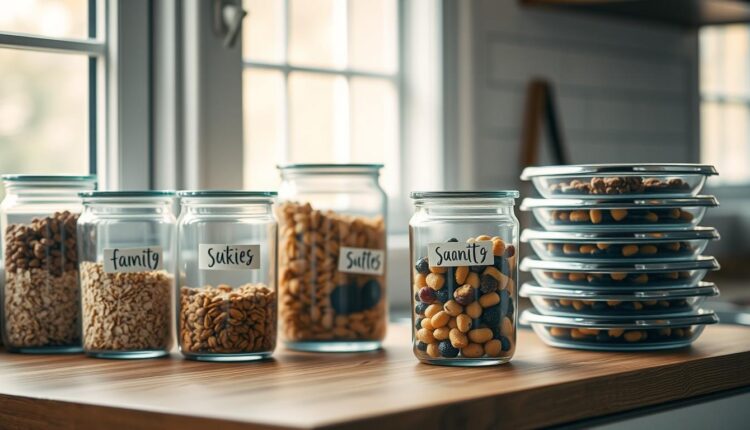Make Ahead Breakfast Label System For Family Organization
Start your day with ease using our make ahead breakfast label system. Perfect for busy families, this system keeps your breakfasts organized and stress-free.
I once spent a frantic Tuesday morning digging through unmarked containers while my kids asked for pancakes that definitely existed somewhere. Sound familiar? Nearly 30% of adults skip morning fuel because routines feel too rushed—but what if your kitchen could whisper calm instead of chaos?
This isn’t about rigid schedules or Pinterest-perfect spreads. It’s about a simple family meal prep plan that turns “Where’s my food?” into “I’ve got this.” Imagine opening your fridge to see labeled jars of overnight oats, breakfast wraps stacked like edible Legos, and portioned fruit cups ready to grab. No more guessing games.
Here’s the secret: clarity beats complexity. A stress-free breakfast system starts with clear labels and intentional prep. Batch-cook muffins on Sunday, freeze egg bites Wednesday night, and watch Thursday’s sunrise with coffee in hand instead of panic.
I’ve burned enough forgotten breakfast casseroles to know—labels matter. They’re love notes to your future self. When every container shouts its contents and date, you’ll reclaim 15 minutes (and your sanity) daily. Ready to transform your AM hustle into something that actually tastes good?
Introduction to Organized Make-Ahead Breakfasts
My friend Jen texted me a photo of her fridge last week—rows of glass jars filled with chia puddings and breakfast burritos neatly dated. “No more scavenger hunts,” she wrote. That’s the magic of intentional prep.
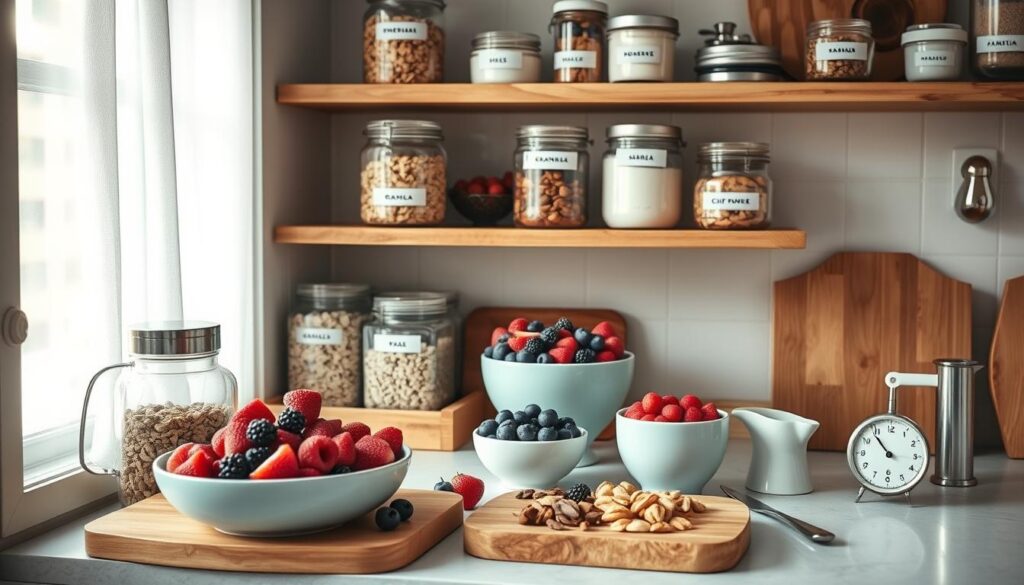
The Basics of Smart Morning Fuel
A prepared breakfast system means designing your AM routine before the chaos hits. Think Sunday batch-cooking sessions creating ready-to-reheat meals. Glass containers of overnight oats. Freezer-friendly egg bites. It’s about trading “What’s for breakfast?” for “Grab and go.”
Why Order Beats Chaos Every Time
Rushed mornings drain energy before your day starts. But when you’ve got:
- Pre-portioned smoothie packs in the freezer
- Homemade granola jars by the coffee maker
- Boiled eggs waiting in dated containers
…you gain back precious minutes. Last month, my labeled oat jars saved me when the school bus came early. No frantic searches—just open, pour milk, and breathe.
This isn’t about perfection. My first attempt at breakfast burritos ended with salsa-stained labels. But even messy systems work better than none. When your kitchen supports you, mornings transform from frantic to focused.
Benefits of Prepping Breakfasts in Advance
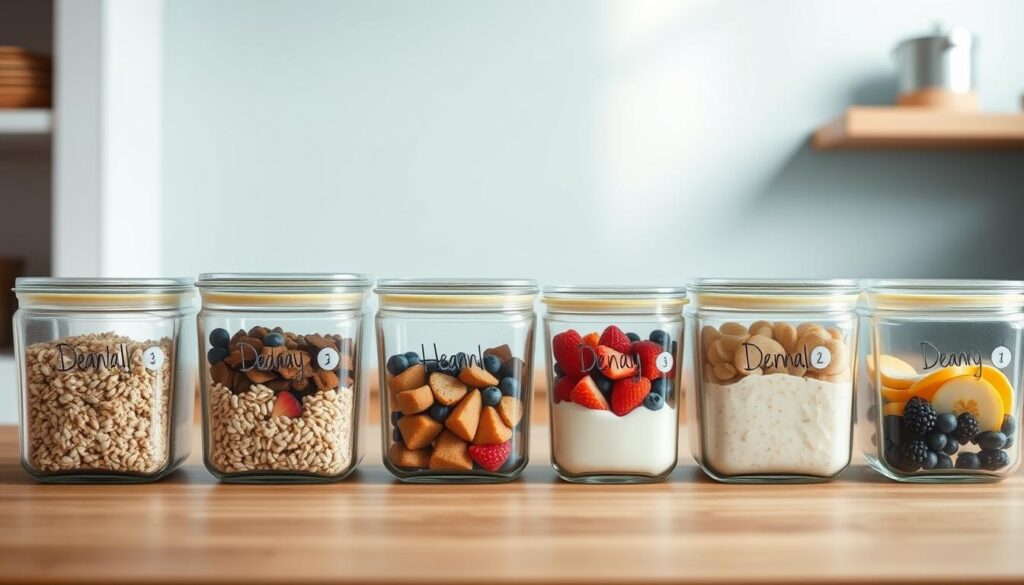
I burned toast three mornings straight before realizing: prepping isn’t about perfection—it’s about progress. When you craft a week’s worth of breakfast in one session, you trade chaos for calm. Here’s what I’ve learned through trial (and smoke alarms).
Batch cooking works like a kitchen time machine. Spend 90 minutes on Sunday:
- Whip up two dozen egg muffins
- Portion Greek yogurt parfaits
- Freeze peanut butter banana wraps
Suddenly, Tuesday’s rushed commute includes a protein-packed meal. No more staring into the fridge while coffee gets cold.
| Challenge | Solution | Benefit |
|---|---|---|
| Picky eaters | 3 breakfast options ready | Fewer morning negotiations |
| Decision fatigue | Pre-labeled containers | Brainpower saved for bigger tasks |
| Nutrition gaps | Oatmeal jars with chia seeds | Steady energy till lunch |
Egg-based dishes became my secret weapon. They reheat beautifully and keep everyone full. My kids now grab spinach frittata bites like they’re candy—just don’t tell them about the veggies.
Plenty of mornings still feel hectic. But opening the fridge to see ready meals? That’s adulting victory. Trust me—your future self will high-five you through every reheated breakfast burrito.
Planning Your Weekly Breakfast Prep Schedule
Last month, I spilled coffee on my only clean shirt while scrambling to find something edible. That’s when I finally cracked the code: a rhythm beats a rigid plan. Here’s how to design a prep schedule that bends instead of breaks.
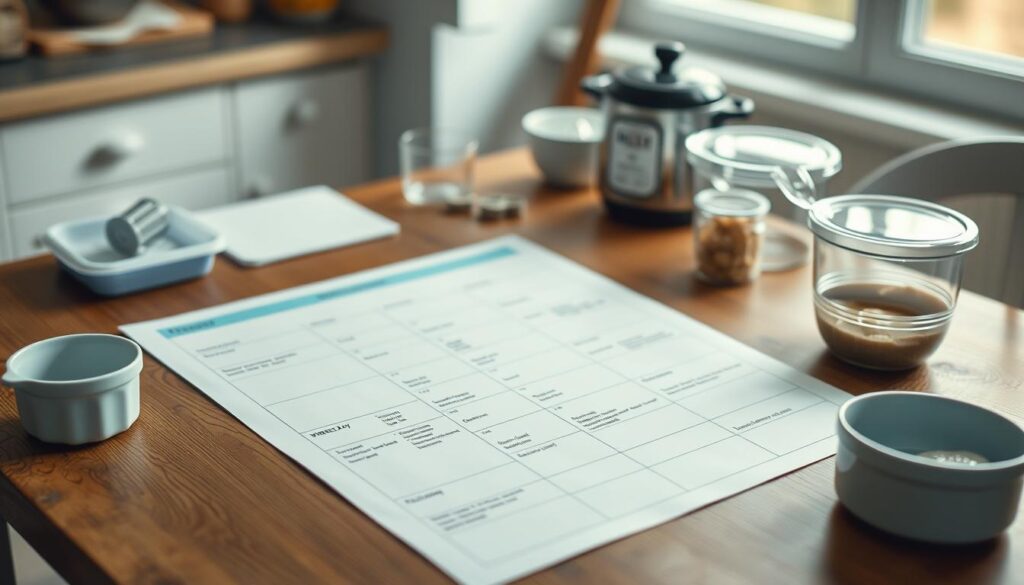
Creating a Prep Timeline
Start by dividing your week into three zones:
- Power Hour (Sunday): 60 minutes for batch-cooking oatmeal jars and chopping fruits
- Flash Prep (Wednesday): 15 minutes to refresh toppings and boil eggs
- Grab Time (Daily): 2 minutes to assemble toast with pre-sliced cheese or nut butter
My current favorite rhythm? Sunday’s sweet potato hash becomes Monday’s breakfast tacos. Thursday’s leftover oats transform into Friday’s baked oatmeal cups. Keep ingredients like whole grain bread, almond butter, and frozen berries stocked for quick fixes.
| Day | Prep Task | Time Needed | Key Ingredients |
|---|---|---|---|
| Sunday | Batch cook oats & chop veggies | 45 minutes | Steel-cut oats, spinach, bell peppers |
| Tuesday | Prep toast toppings | 10 minutes | Avocado, everything bagel seasoning |
| Friday | Freezer inventory check | 5 minutes | Bananas, whole grain waffles |
Even 20 minutes on Sunday yields rewards. Portion Greek yogurt into jars, layer with granola, and top with thawed berries. Your future self will thank you when Tuesday’s alarm rings late. The secret? Treat prep like a choose-your-own-adventure book—some structure, endless possibilities.
Fully cool cooked items before sealing to prevent sogginess and preserve texture—your future self (and your freezer) will thank you.
Implementing the make ahead breakfast label system
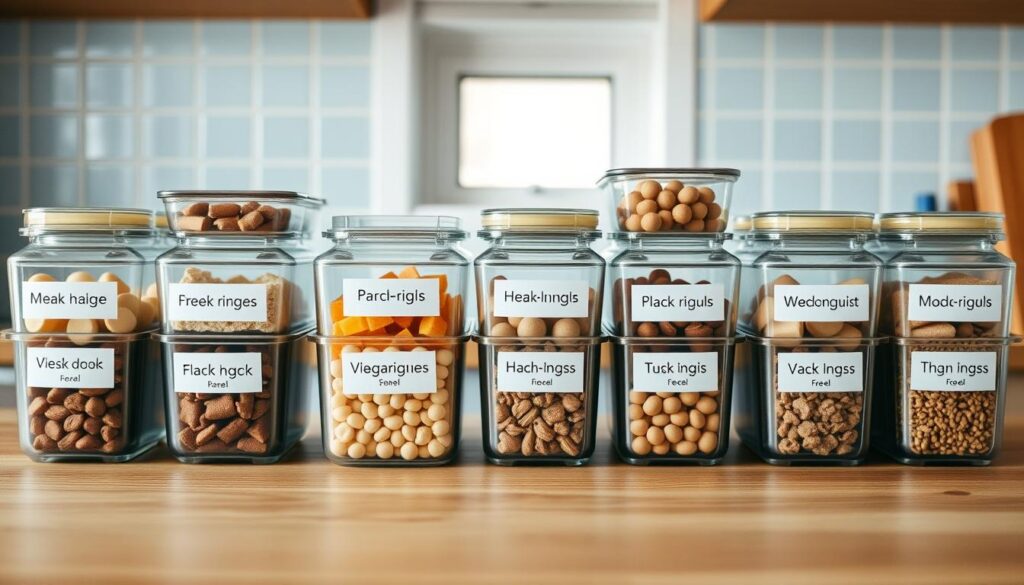
Last winter, I served blueberry muffins to my neighbor thinking they were savory egg bites. That’s when I vowed to master container identification. A clear labeling process turns “What’s this?” into “I know exactly what’s next.”
Step-by-Step Guide to a Smooth Labeling Process
- Choose your tools first: Painter’s tape sticks best to cold surfaces. A grease pencil works wonders on glass jars. I keep both in my utensil drawer.
- Write meal names + dates: “Sweet Potato Frittata – 7/12” beats “Breakfast Stuff.” Freezer bags get reheating notes: “Microwave 90 sec” or “Oven 350°F 12 min.”
- Color-code for diets: Green tape = vegetarian. Blue = gluten-free. My teen knows red means “contains nuts.”
For recipes with variations, add shorthand: “Oats (PB)” for peanut butter or “Egg Cups (V)” for veggie-packed. When prepping multiple batches, stack containers with labels facing forward. No more digging.
Sunday’s chicken sausage scramble becomes Wednesday’s breakfast tacos when you note “Add tortillas” on the label. Always include reheating times—those egg dishes go from fluffy to rubbery fast. My rule? If it takes longer than my coffee brew cycle, it needs adjustment.
Stick to a weekly refresh ritual. Every Friday while the oven preheats for pizza night, I update labels. Takes three minutes. Saves ten times that in morning confusion. You’ll never bite into cinnamon oatmeal expecting scrambled eggs again.
Creative Make-Ahead Breakfast Ideas
Last summer, I packed my husband a “savory muffin” that turned out to be banana bread. Now I stick to color-coded containers. Morning fuel shouldn’t require detective work—it should spark joy (and keep hunger at bay). Let’s explore flavors that break the monotony.
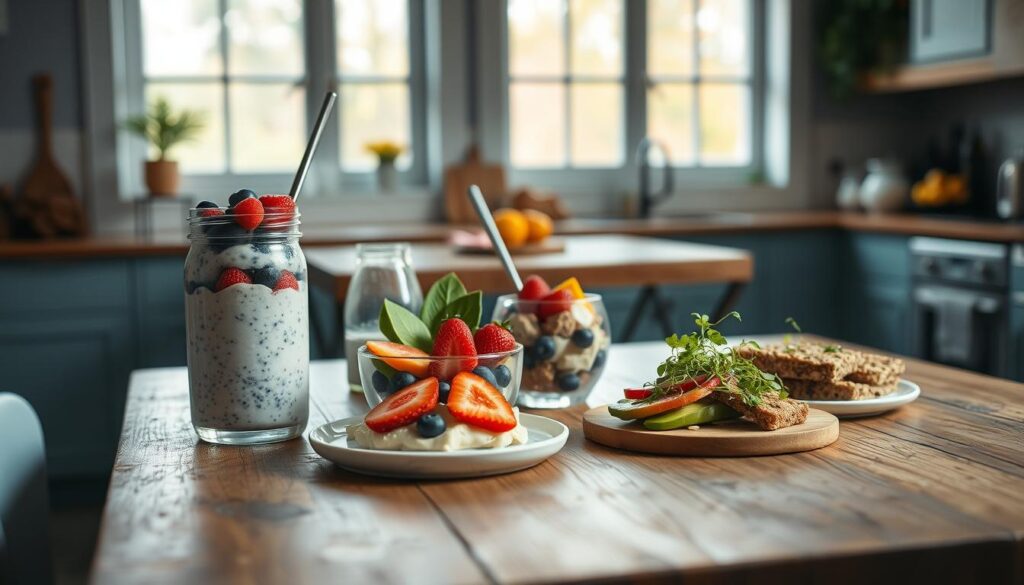
Egg-Based Recipes and Protein-Packed Options
Eggs are the ultimate blank canvas. Try whisking 12 eggs with diced peppers and shredded cheese—pour into muffin tins for portable bites. Bake at 375°F for 18 minutes. For extra richness, layer cooked bacon crumbles or smoked salmon before baking.
Protein power combos:
- Turkey sausage + spinach frittata slices
- Breakfast tacos with scrambled eggs and black beans
- Greek yogurt bowls topped with almonds and honey
Double the cheese in your egg casseroles—it helps bind ingredients and adds satisfying creaminess. Freeze portions between parchment paper for easy separation.
Overnight Oats, Smoothies, and More
Overnight oats thrive on variation. Mix rolled oats with milk or almond milk, then add:
- Peanut butter + sliced bananas
- Chia seeds + mango chunks
- Pumpkin puree + cinnamon
Prep four jars on Sunday for grab-and-go mornings. For smoothie lovers, freeze pre-portioned spinach, berries, and protein powder in bags. Just add liquid and blend.
Pair sweet options with salty sides: apple slices with cheddar cheese, or oatmeal with crispy bacon bits. Rotate textures to keep taste buds guessing—crunchy granola one day, silky chia pudding the next.
Your turn: What’s your favorite unexpected breakfast combo? Mine’s cottage cheese pancakes with lemon zest. They freeze beautifully—no syrup required.
Prepping Strategies for Busy Mornings
My freezer once held a mysterious “soup” that turned out to be smoothie cubes. Now I treat cold storage like a chessboard—every move matters. Proper cooling and stacking aren’t just about space. They’re your ticket to mornings where you actually taste your coffee.
Utilizing the Freezer and Fridge Efficiently
Food safety experts agree: cool cooked items completely before freezing. I spread quinoa breakfast bowls on sheet pans for 20 minutes first. This prevents ice crystals from turning your meal prep into a science experiment.
Portion smarter, not harder:
- Freeze pancakes in stacks of two between parchment paper
- Store frittata slices upright in narrow containers
- Use deli cups for yogurt parfaits—they stack like Tetris
Label freezer bags with dates and reheating hacks. My Wednesday chia pudding gets a Sharpie note: “Stir before microwaving – 1 minute.” Clear bins in the fridge door hold grab-and-go items. Rotate older batches to the front every grocery day.
“Your freezer is a pause button, not a time machine. Quality degrades after three months—mark dates boldly.”
Sunday’s batch of breakfast sandwiches becomes Monday through Wednesday fuel. By Thursday? Leftover roasted veggies transform into Friday’s egg scramble. This rhythm keeps things fresh without daily decisions.
Your fridge’s top shelf is prime real estate. Keep your most-used items there: boiled eggs, prepped fruit, and overnight oats. Bottom drawers handle bulkier items like casserole dishes. When every zone has purpose, you’ll spend less time searching and more time savoring.
Never stack warm containers in the freezer—trap heat, lose quality. Let air circulate so every batch chills fast and evenly.
Organizing Ingredients and Labeling Techniques
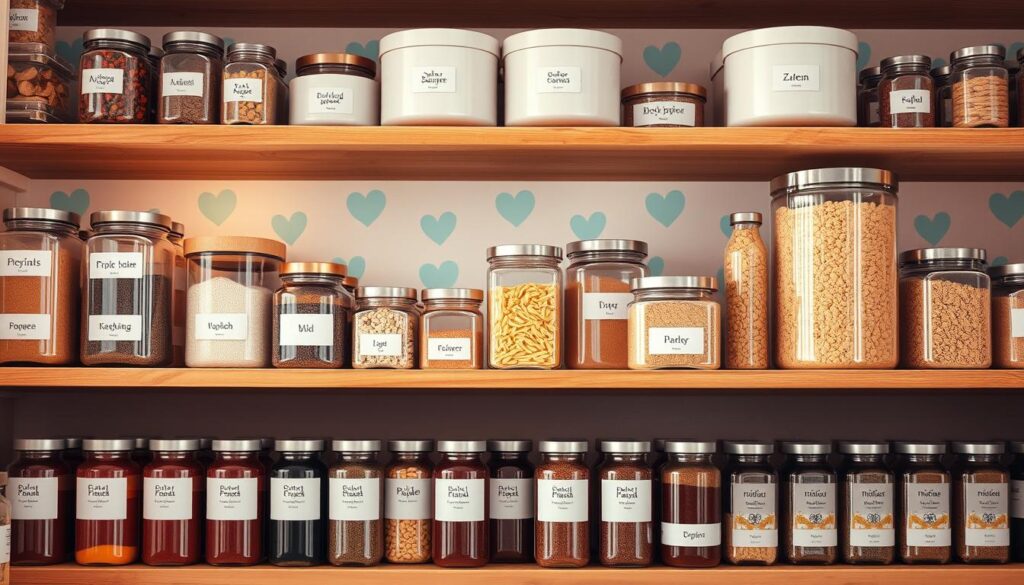
I nearly added cumin to my oatmeal last week—turns out spice jars look identical at 6 AM. Professional meal preppers taught me this golden rule: smart storage solves 80% of morning chaos. Let’s transform your kitchen into a well-oiled machine.
Start by zoning your space:
- Dedicate one shelf to recipe-specific ingredients (oats with chia seeds, muffin liners with baking powder)
- Group proteins like eggs and cheese together in clear bins
- Store grab-and-go items (toast toppings, cookie dough balls) at eye level
Color-coded tape becomes your secret weapon. Try this system:
| Color | Category | Example |
|---|---|---|
| Green | Breakfasts needing reheating | Egg muffins, breakfast sausage |
| Yellow | Ready-to-eat items | Yogurt cups, sliced fruit |
| Blue | Family favorites | PB&J oatmeal jars, banana bread |
Sharpie notes on lids prevent guesswork. My current favorite jar says “Cinnamon Apples – Perfect for Toast” with a heart doodle. For ingredients nearing expiration, stick a red dot on the container—Sunday becomes “use-it-up” breakfast scramble day.
Rotate fridge stock while unloading groceries. New milk goes behind the old. Frozen muffin batches get dated labels like “7/22 – Blueberry (12 count)”. When everything has a home and a story, mornings write themselves.
Keep raw ingredients like eggs or meat separate from prepped meals—cross-contamination turns calm mornings into kitchen regrets.
Customizing Recipes for Family Preferences
My niece scrunched her nose at my pumpkin oatmeal last fall—until we stirred in chocolate chips and renamed it “Halloween porridge.” That’s the beauty of adaptable recipes. When you treat meal prep like a toolkit rather than a rulebook, even picky eaters find joy in morning fuel.
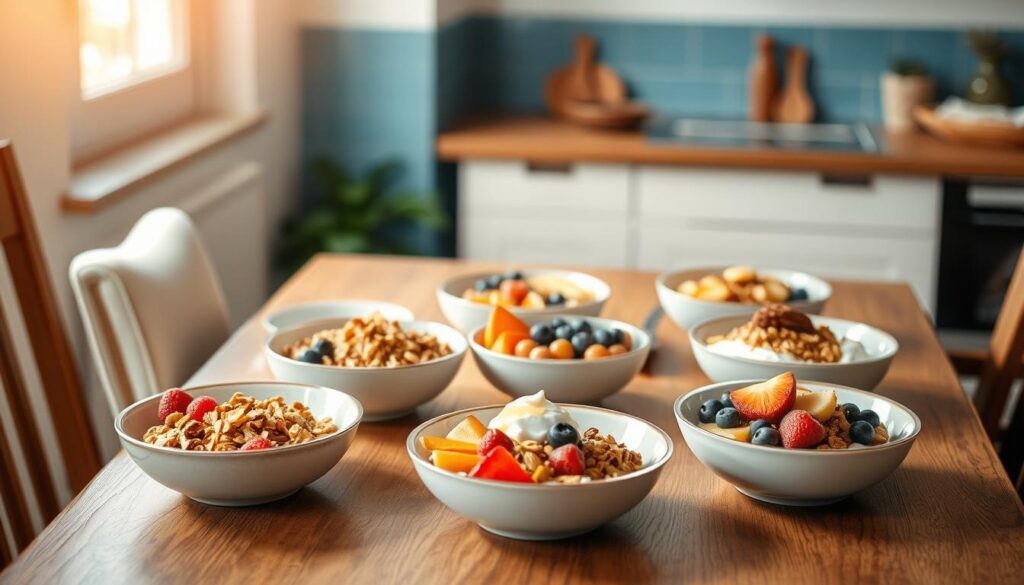
Incorporating Whole Grains and Fresh Fruits
Start with simple swaps. Replace half the white flour in pancake mixes with oat flour for extra fiber. Stir diced apples or frozen berries into oatmeal before reheating—they soften perfectly. For yogurt parfaits:
- Layer Greek yogurt with pomegranate seeds and crushed walnuts
- Swap sugary granola for toasted quinoa clusters
- Use mashed banana instead of honey in chia puddings
Frozen mango chunks transformed my cousin’s “boring” overnight oats into tropical treats. The key? Let family members pick their mix-ins during Sunday prep.
Adding Protein and Healthy Fats
Crunchy toppings make everything better. Keep small jars of:
- Toasted coconut flakes + sunflower seeds
- Crumbled bacon bits + hemp hearts
- Peanut butter drizzle (thin with warm water for pourable consistency)
My brother’s gluten-free waffles went from dry to divine with a smear of almond butter and raspberry jam. For savory lovers, fold shredded zucchini and feta cheese into egg bakes. Remember—customization isn’t extra work. It’s strategic ingredient placement.
Storing, Freezing, and Reheating Tips
I froze pancakes last month only to find them fused into a carb iceberg. Lesson learned: storage strategy matters as much as the recipe. Proper techniques keep your morning fuel tasting like it just left the griddle.
Best Practices for Long-Lasting Freshness
Label everything with dates and contents—”7/14 Bacon Egg Cups” beats “Mystery Muffins.” Store cooked bacon between paper towels in airtight containers. It stays crisp for three days in the fridge or two months frozen.
For muffins and granola toppings:
- Cool completely before sealing in portion bags
- Add a silica packet to absorb moisture
- Reheat in a 325°F oven for 5 minutes to revive crunch
| Food | Freezer Time | Reheating Hack |
|---|---|---|
| Oatmeal Jars | 3 months | Microwave 1 minute, stir, then add milk |
| Breakfast Burritos | 6 months | Wrap in damp paper towel – 90 seconds |
| Egg Bites | 2 months | Oven at 350°F for 8 minutes |
Thaw overnight in the fridge when possible. For last-minute meals, reheating frozen items directly works—just add extra minutes. Stir oats halfway through microwaving to prevent gummy spots.
Bacon lovers: cook entire packs on sheet pans, then freeze slices separately. They crisp up in 3 minutes under the broiler. Your future self will thank you when Wednesday’s breakfast tastes like Sunday’s effort.
Family Involvement in the Breakfast Routine
My 7-year-old once “helped” prep pancake mix by coating the counter in flour—but when we slid those Mickey Mouse-shaped cakes onto his plate? Pure pride. That’s the messy magic of cooking together. Involving your crew transforms rushed mornings into bonding moments where everyone contributes.
Engaging Kids in Meal Prep and Labeling
Start small. Let little hands:
- Drop berries into yogurt cups (great for motor skills)
- Press cookie cutters into whole grain toast
- Place bacon bits into egg muffin tins with a spoon
Turn labeling into art time. Use washable markers on containers—my niece draws smiley faces on her oatmeal jars. For older kids, create a “breakfast station” with:
| Age Group | Task | Tools |
|---|---|---|
| 3-5 years | Wash fruit | Colander, step stool |
| 6-8 years | Assemble parfaits | Pre-portioned yogurt & granola |
| 9+ years | Date labels | Dry-erase markers |
Safety first: Teach kids to crack eggs over a separate bowl (no shell fishing expeditions). Use plastic knives for spreading nut butter on apple slices. My rule? If they can reach the counter, they can participate.
Pair teamwork with flavor wins. Try layering:
- Vanilla yogurt + frozen peaches (thaw overnight)
- Whole grain toast + mashed avocado + everything seasoning
- Scrambled eggs + pre-chopped bell peppers from Sunday’s prep
Last week, my son invented “breakfast sushi”—banana slices wrapped in whole grain tortillas with peanut butter. Was it perfect? Nope. Did he eat every bite? Absolutely. That’s the secret sauce: when kids invest effort, they savor the results.
Tips and Tricks from Experienced Preppers
Last Thursday, I grabbed what I thought was chia pudding—turned out to be leftover guacamole. Let’s skip that spicy surprise and dive into proven hacks that’ll keep your breakfast game smooth.
Labeling Hacks and Time-Saving Insights
Painter’s tape is your new best friend. Stick it on containers, write meal names with a Sharpie, and peel it off without residue. For freezer burritos, add reheating times: “90 seconds, flip halfway.”
Try these shortcuts:
- Use symbols instead of words: 🥓 = bacon egg cups, 🥣 = oatmeal variations
- Pre-measure dry ingredients like pancake mix in jars labeled “Add 1 cup milk”
- Store shredded cheddar in portioned bags for quick egg scrambles
My favorite time-saver? Designate a “breakfast zone” in your fridge:
| Zone | Contents | Prep Night Before? |
|---|---|---|
| Top Shelf | Boiled eggs, yogurt cups | Yes |
| Door | Nut butter packets, mini jams | No |
| Drawer | Pre-chopped veggies for omelets | Yes |
Once mistook salt for sugar in my oatmeal—now I mark savory/sweet jars with washi tape. Small tweaks like these turn chaotic mornings into “I’ve got this” moments. Even five minutes of night-before prep pays off when the sun rises.
“Label like someone’s stealing your coffee—clear, specific, and slightly dramatic.”
Your turn: What’s one tiny change you’ll top your routine with this week? Mine’s freezing egg bites in silicone molds for faster reheating. No more guacamole breakfasts—promise.
If a container’s puffed, smells funky, or leaks mystery liquid—toss it. No breakfast is worth a foodborne rollercoaster.
Last spring, I found myself smiling at my fridge instead of sighing—all thanks to labeled jars of overnight oats and prepped smoothie packs. What changed? A rhythm where clarity rules and chaos fades. Those extra minutes spent organizing? They gift you mornings where coffee stays hot and everyone leaves fueled.
Here’s the sweet spot: simple steps create big wins. Stock your fridge with ready-to-grab breakfasts like yogurt cups or oat jars. Let family members customize their toast toppings or parfait layers. These small investments? They add up to smoother days where you’re steering the ship.
Your turn: tweak a favorite recipe this week. Swap almond milk in your oats or layer berries into chia puddings. Share your wins (or hilarious fails) in the comments—we’re all learning together. Because when your kitchen works for you, every sunrise tastes better.
Mini Breakfast Polenta Cups
These cheesy mini polenta cups are filled with veggies and protein, perfect for make-ahead breakfasts that reheat beautifully. A cozy, savory option that’s kid-friendly and endlessly customizable.
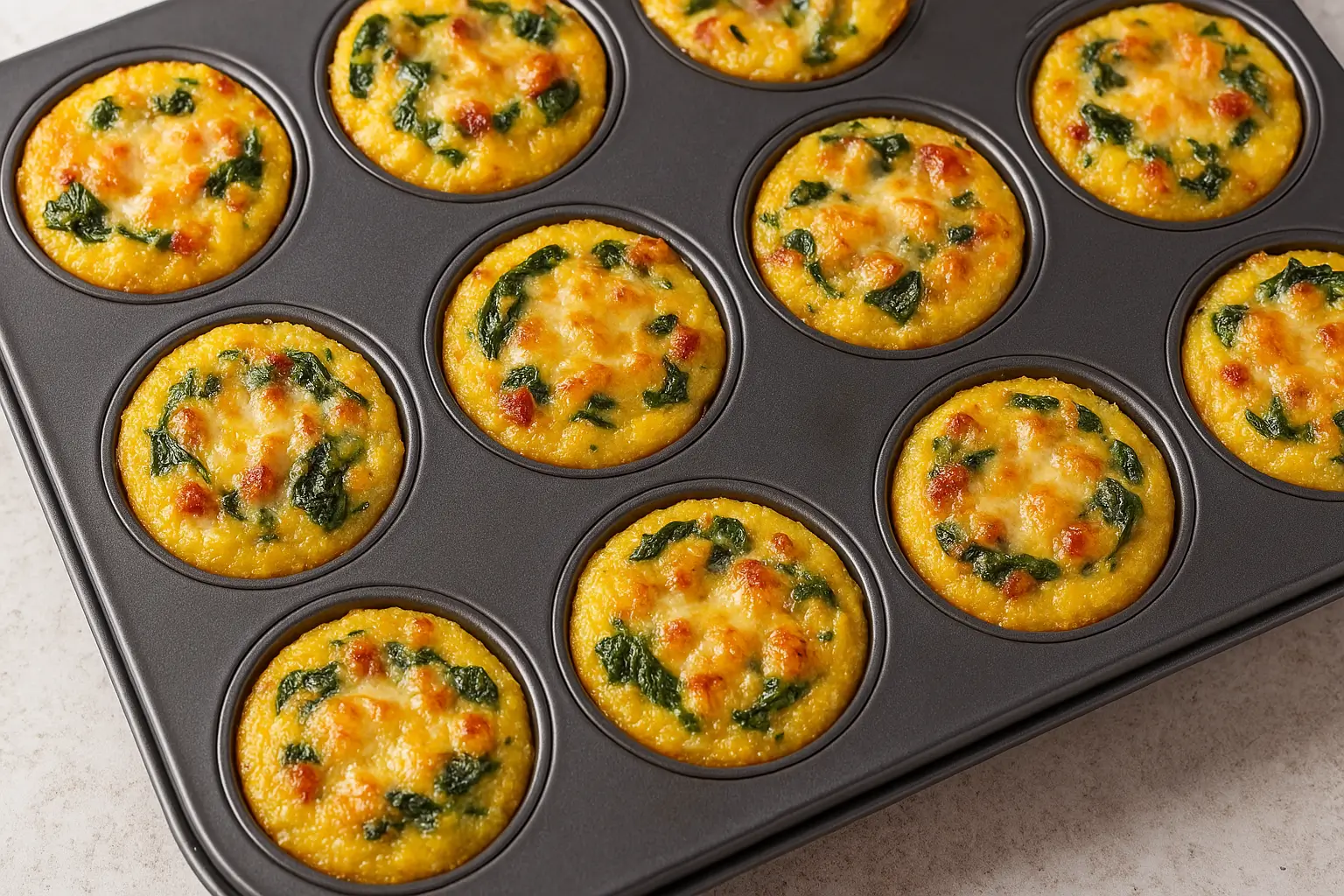
Nutrition Information
Equipment Needed
- Muffin tin
- Medium saucepan
- Mixing bowl
- Whisk
Ingredients
-
1 cup instant polenta
-
3 cups low-sodium vegetable broth
-
1/2 teaspoon salt
-
1/2 teaspoon garlic powder
-
1/4 teaspoon black pepper
-
1/2 cup shredded sharp cheddar
-
1/4 cup grated Parmesan cheese
-
1 cup sautéed spinach (well-drained)
-
1/2 cup chopped roasted red peppers
-
3 large eggs
Instructions
Recipe Video
Mediterranean Savory Muffins
A step-by-step guide to making delicious Mediterranean savory muffins, featuring ingredients like olives, feta cheese, and sun-dried tomatoes. Perfect for breakfast or as a snack.

